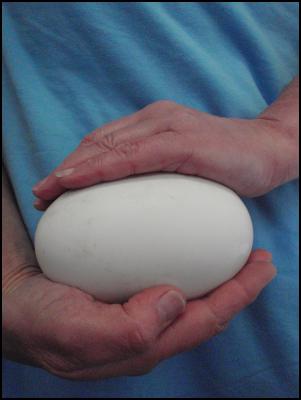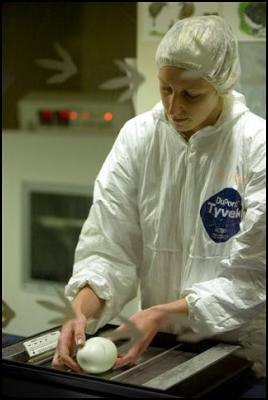Unusually late kiwi egg arrives at Rainbow Springs

News Release
Unusually late kiwi egg
arrives at Rainbow Springs
Rotorua, 13 June, 2012 – A very late kiwi egg arrival is in incubation at Rainbow Springs in Rotorua.
The kiwi hatching season is usually well over by now but late last week an egg was brought in from Maungataniwha (in the Napier area) and it's the latest egg to ever arrive at the park.
The dad's name is Para, and Kiwi Encounter at Rainbow Springs - which incubates the eggs - hatched sibling chicks earlier this season named Graph and Phrase – Para-Graph and Para-Phrase.
Kiwi Encounter Kiwi Husbandry Manager Claire Travers says, "After 'candling' the egg - examining it with a light - to look at its development, it looks perfectly healthy and will probably hatch just before or during the school holidays."
Kiwi Encounter is an interactive display of kiwi and the new arrival will be on display not long after it arrives.
Rainbow Springs Kiwi Encounter is the largest hatchery of North Island brown kiwis and successfully hatched its 1,000 kiwi named Mille - French for one-thousand - in September last year.
Rainbow Springs involvement in kiwi conservation began in 1995 with the arrival of an orphaned egg and the hatchery has grown over the years to become the largest kiwi hatching facility in New Zealand, successfully incubating and hatching brown kiwi eggs from around the North Island as part of the BNZ Save the Kiwi Trust programme.
The kiwi eggs are kept safe and warm until they hatch allowing the newborn chicks to get a strong start in life away from predators such as stoats and cats. Once the chicks reach a healthy weight of around 1kg they are returned to the wild.
"We're very proud to be playing such an important role in the conservation of kiwi and our efforts go a long way to ensuring the survival of these amazing birds."

BNZ Operation Nest Egg™ (O.N.E) is a
powerful tool to reverse the decline of key kiwi
populations. Eggs and chicks are harvested from nests to
save them from stoats and cats. The young kiwi are returned
to the wild when they weight about 1kg, big enough to fight
off these predators. More than 1600 kiwi chicks have been
returned to the wild since the programme began in 1994, with
captive facilities and hundreds of field workers from DOC
and community groups throughout the country contributing to
its success. The BNZ Operation Nest Egg™ egg
harvesting-chick rearing-return to the wild technique was
developed for kiwi through research funded solely by BNZ and
is now also used in other species recovery
programmes.
ENDS


 Vegetables New Zealand: Asparagus Season In Full Flight: Get It While You Still Can
Vegetables New Zealand: Asparagus Season In Full Flight: Get It While You Still Can  Bill Bennett: Download Weekly - How would NZ telecoms cope with another cyclone
Bill Bennett: Download Weekly - How would NZ telecoms cope with another cyclone NZ On Air: Firm Audience Favourites Lead NZ On Air Non-Fiction Funding
NZ On Air: Firm Audience Favourites Lead NZ On Air Non-Fiction Funding Insurance and Financial Services Ombudsman: Woman Gets $40k More After Disputing Insurer’s Decision
Insurance and Financial Services Ombudsman: Woman Gets $40k More After Disputing Insurer’s Decision BNZ: A Quarter Of Older NZers Fear Going Online Due To Scam Concerns
BNZ: A Quarter Of Older NZers Fear Going Online Due To Scam Concerns University of Auckland: Scientists Develop Tool To Monitor Coastal Erosion In Fine Detail
University of Auckland: Scientists Develop Tool To Monitor Coastal Erosion In Fine Detail



